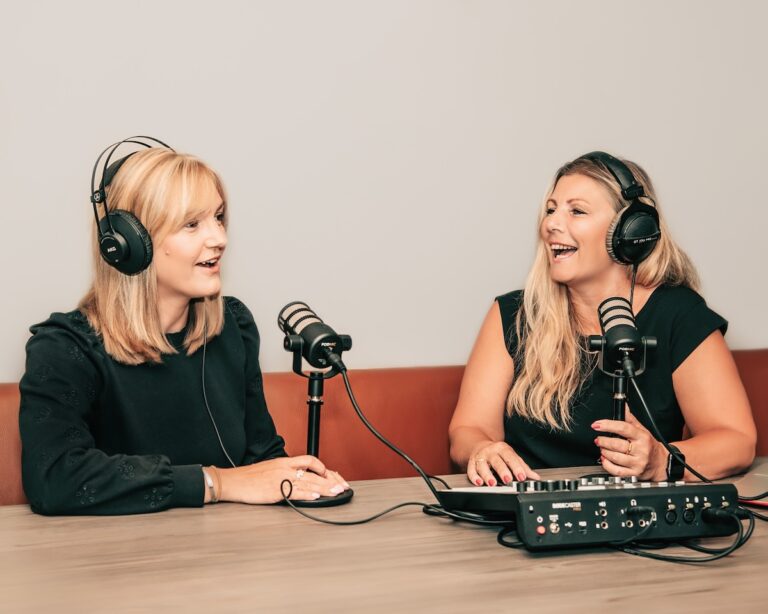Podcasting has become a powerful tool for businesses of all sizes, offering a unique way to reach audiences and build brand loyalty. For small and medium-sized enterprises (SMEs) in the UK, podcasting provides an affordable marketing option that can deliver significant returns.
In this blog, Kath Lord-Green, aka Your Fairy Podmother® of Voice It Podcast Agency, will help you start a podcast on a budget, covering essential equipment, software, and tips to get the most out of your efforts without breaking the bank.
Why Start a Podcast?
Podcasts allow you to connect directly with your audience in a personal and engaging way. They are an excellent  platform for sharing industry insights, company updates, and stories that resonate with your listeners. Moreover, podcasts can enhance your brand’s credibility, establish you as an authority in your field, and drive traffic to your website or social media channels.
platform for sharing industry insights, company updates, and stories that resonate with your listeners. Moreover, podcasts can enhance your brand’s credibility, establish you as an authority in your field, and drive traffic to your website or social media channels.
Getting Started: Planning Your Podcast
- Define Your Goals and Audience:
- Before you begin, identify WHY you want to start a podcast. Are you aiming to educate your audience, build brand awareness, or generate leads?
- Determine who your target audience is. Understand their interests and what type of content will provide value to them.
- Choose Your Format:
- Decide on the format of your podcast. Common formats include interviews, solo shows, panel discussions, and storytelling. Choose one that aligns with your goals and is manageable within your budget. Don’t forget that the easiest way to start is with YOU sharing content, no guests – just YOU!
- Plan Your Content:
- Create a content calendar with episode topics and release dates. Consistency is crucial for building and retaining an audience, so plan to release episodes regularly, whether weekly, bi-weekly, or monthly.
Budget-Friendly Equipment
Starting a podcast doesn’t require expensive equipment. In fact, you can start with NOTHING if you like! Record your voice into your phone, laptop or PC – no headphones and no microphone!
But if you want to go down the equipment route, here’s a list of budget-friendly essentials:
- Microphone:
- A good quality microphone is essential for clear audio. The Audio-Technica ATR2100x-USB or the Samson Q2U are excellent budget options that deliver professional sound quality.
- Headphones:
- Invest in a pair of comfortable, closed-back headphones. The Audio-Technica ATH-M20x or the Sony MDR-7506 are affordable and reliable choices. (you can also just plug in your old phone earphones – try not to use wireless headphones as sometimes it dips the sound).
- Pop Filter:
- A pop filter helps reduce unwanted popping sounds from plosive consonants like SSSSS and PPPPP. You can find inexpensive options on Amazon or other online retailers.
- Boom Arm or Microphone Stand:
- A boom arm or stand keeps your microphone steady and at the right height. There are many budget-friendly options available that will do the job.
Free and Low-Cost Software
- Recording Software:
- Audacity: A free, open-source audio recording and editing software that is user-friendly and widely used by podcasters.
- GarageBand: Free for Mac users, GarageBand is a versatile tool for recording and editing podcasts.
- If you want a paid for version Adobe is what to look at.
- Editing Software:
- Both Audacity and GarageBand can be used for editing as well. They offer a range of features to help you clean up your audio and add effects and again a paid for version is Adobe.
- Hosting Platforms:
- Buzzsprout, Anchor, Podbean: Are podcast hosting platforms that also distributes your podcast to major directories like Apple Podcasts, Spotify, and Google Podcasts (I use Buzzsprout and it offers 90 days free before any charges – look into the others too!).
Recording and Editing Tips
- Find a Quiet Space:
- Choose a quiet location to record your episodes to minimise background noise. Consider using cushions, beanbags and duvets or foam panels to improve sound quality if necessary.
- Record in Batches:
- Recording multiple episodes in one session can save time and help you stay consistent with your release schedule.
- Edit Carefully:
- Spend time editing your episodes to remove mistakes, pauses, and background noise. Add intros, outros, and music to give your podcast a professional touch.
Promoting Your Podcast
- Leverage Social Media:
- Use your existing social media channels to promote new episodes. Share clips, quotes, and behind-the-scenes content to engage your audience.
- Collaborate with Others:
- Partner with other podcasters or influencers in your industry to expand your reach. Guest appearances can introduce your podcast to new audiences.
- Engage Your Audience:
- Encourage listeners to leave reviews, subscribe, and share your podcast. Respond to feedback and incorporate listener suggestions into future episodes.
- Use Your Website:
- Embed your podcast episodes on your website and create blog posts around each episode. This helps with SEO and provides additional content for your audience.
Repurposing Content
Repurposing podcast content can extend its reach and maximise its value:
- Transcriptions:
- Convert podcast episodes into written transcripts and post them on your website as blog articles. This caters to those who prefer reading and improves SEO and is very inclusive, offering the choice to listen or read!
- Social Media Clips:
- Extract short, engaging clips from your podcast episodes and share them on social media platforms like Instagram, LinkedIn, and Facebook.
- Email Newsletters:
- Include highlights and key takeaways from your podcast episodes in your email newsletters to keep
 subscribers informed and encourage them to listen to the full episodes (or send audio newsletters – see August – Dip Your Toe Into Podcasting).
subscribers informed and encourage them to listen to the full episodes (or send audio newsletters – see August – Dip Your Toe Into Podcasting).
- Include highlights and key takeaways from your podcast episodes in your email newsletters to keep
Promoting your podcast through various channels and repurposing content will further enhance its impact, making it a valuable addition to your marketing strategy.
Podcasting doesn’t need to be expensive; the biggest cost might be your time!
Take a listen to “How to Podcast For Business”
Happy Podcasting!

